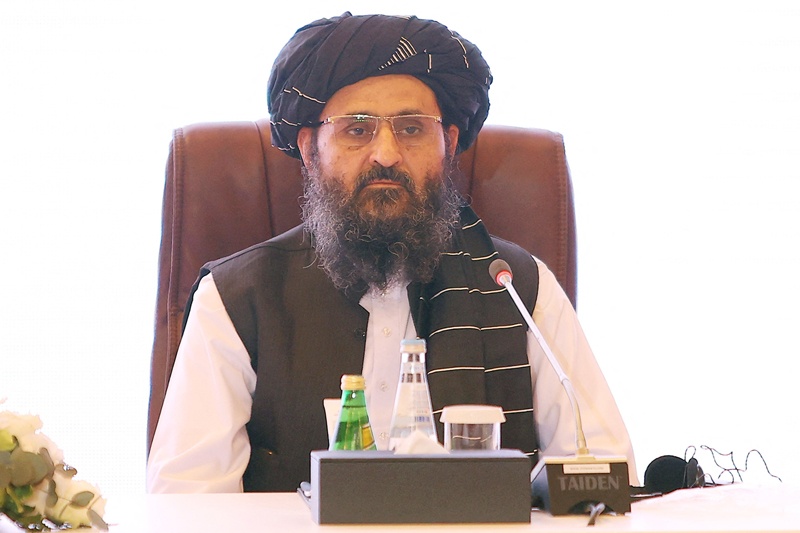KABUL: The Taleban said yesterday the war in Afghanistan was over and that all their opponents would be pardoned, as they held their first news conference since seizing power from the Western-backed government in Kabul. "War has ended... (the leader) has pardoned everyone," spokesman Zabihullah Mujahid said, adding: "We are committed to letting women work in accordance with the principles of Islam."
Shortly before he spoke, the Taleban's deputy leader Mullah Abdul Ghani Baradar - who also co-founded the movement - arrived in Kandahar, landing in the insurgent group's former capital just days after they took control of the country. Mujahid said the Taleban would soon be establishing a government, but gave little detail of its make-up apart from saying they would "connect with all sides". "All those in the opposite side are pardoned from A to Z," he said. "We will not seek revenge."
Asked what the difference between the movement that was ousted 20 years ago and the Taleban of today, he said: "If the question is based on ideology, and beliefs, there is no difference... but if we calculate it based on experience, maturity, and insight, no doubt there are many differences. The steps today will be positively different from the past steps."
A spokesman for the group's political office in Doha, Suhail Shaheen, told Britain's Sky News that women would not be required to wear the all-covering burqa, but did not say what attire would be deemed acceptable. "The burqa is not the only hijab (headscarf) that (can) be observed, there is different types of hijab not limited to burqa," he said. Women "can get education from primary to higher education - that means university. We have announced this policy at international conferences, the Moscow conference and here at the Doha conference (on Afghanistan)," Shaheen said. Thousands of schools in areas captured by the Taleban were still operational, he added.
Baradar's arrival from Qatar - where he has spent months leading talks with the United States and then Afghan peace negotiators - crowns a stunning comeback for the Taleban after being ousted 20 years ago. Tens of thousands of people have tried to flee the country to escape the hardline Islamist rule expected under the Taleban, or fearing direct retribution for siding with the US-backed government that ruled for the past two decades.
Significantly Baradar, now deputy leader of the group, chose to touch down in Afghanistan's second biggest city Kandahar - the Taleban's spiritual birthplace and capital during their first time in power. He landed hours after evacuation flights from Kabul's airport restarted after chaos Monday when huge crowds mobbed the apron, with some people so desperate they clung to the fuselage of a US military plane as it rolled down the runway for take-off.
The Taleban led a pariah regime from 1996 to 2001, infamous for a brutal rule in which girls could not go to school, women were barred from working in jobs that would put them in contact with men, and people were stoned to death. US-led forces invaded following the Sept 11 attacks, in response to the Taleban giving sanctuary to Al-Qaeda, and toppled them.
Now the Taleban are back in power, they have sought to project an air of restraint and moderation, including by announcing a "general amnesty" for government workers. "Those working in any part or department of the government should resume their duties with full satisfaction and continue their duties without any fear," a Taleban statement said.
Some shops also reopened as traffic police were back on the streets, while Russia's ambassador to Afghanistan Dmitry Zhirnov met with the Taleban in Kabul, hailing on state television a "positive and constructive" meeting. "They are currently engaged in restoring order in the city and have succeeded in this," Zhirnov said in an interview from Kabul with Rossiya 24.
A Taleban official also gave an interview to a female journalist on an Afghan news channel, and a girls' school reopened in the western city of Herat. Russia's foreign minister Sergei Lavrov said the Taleban had sent a "positive signal" by showing a "readiness to respect the opinion of others".
In the capital, however, schools and universities remained closed, few women openly took to the streets and men had shed their Western clothes for traditional garb. "The fear is there," said a shopkeeper who asked not to be named after opening his small neighborhood provisions store. The UN Security Council also said Monday the international community must ensure Afghanistan does not become a breeding ground for terrorism. "The world is watching," UN Secretary-General Antonio Guterres said.
The Taleban took effective control of the country on Sunday when president Ashraf Ghani fled and the insurgents walked into Kabul with no opposition. It capped a staggeringly fast rout of all cities in just 10 days, achieved with relatively little bloodshed, following two decades of war that claimed hundreds of thousands of lives. The collapse came after US President Joe Biden withdrew US troops, under the false belief that the Afghan army - with billions of dollars in American funding and training - was strong enough to withstand the Taleban.
In his first comments since the Taleban victory, Biden admitted their advance had unfolded more quickly than expected. But he heaped criticism on Ghani's government, insisted he had no regrets, and emphasized US troops could not defend a nation whose leaders "gave up and fled". "We gave them every chance to determine their own future. We could not provide them with the will to fight for that future," Biden said in his address at the White House. "American troops cannot and should not be fighting in a war and dying in a war that Afghan forces are not willing to fight for themselves."
NATO Secretary-General Jens Stoltenberg also blamed Afghan leaders for the "tragedy". "Ultimately, the Afghan political leadership failed to stand up to the Taleban and to achieve the peaceful solution that Afghans desperately wanted," he said. - AFP
.jpg)




